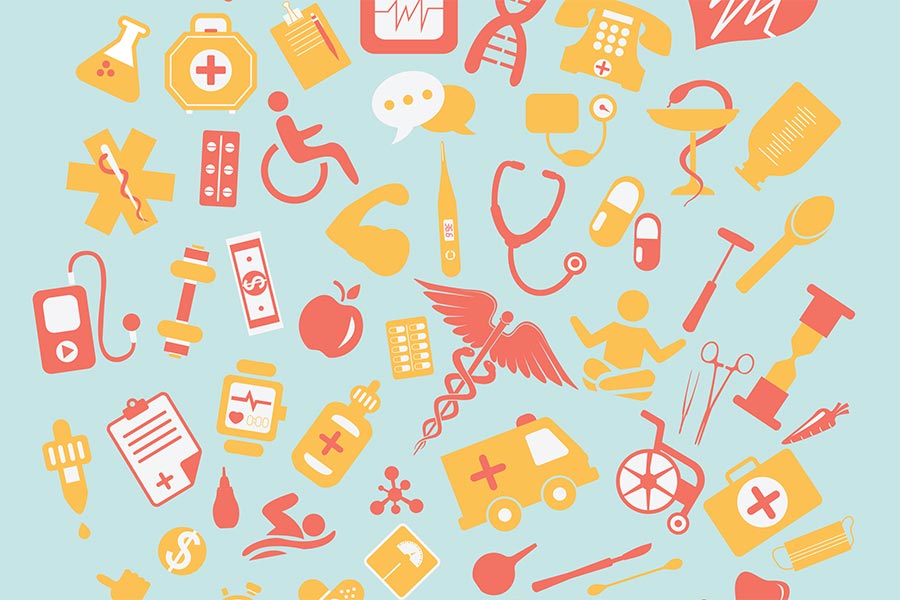LIFE OF THE MIND
Listen! Your Health Depends on It
Communication and media professor Carolyn Lagoe explores health communication campaigns designed to change behavior.
by Carolyn Lagoe
illustration by Jiani Su '17

What is health communication? I get asked that question a lot.
Health communication is the use of communicative strategies to promote health knowledge, attitudes, and behaviors. Through this disciplinary lens, a number of important issues can be explored, including the use of social media to promote health, patient-provider interactions, and the effective development, implementation, and evaluation of health campaigns.
I began along this trajectory after taking a health communication class as an undergraduate at the University at Buffalo. I always had an interest in health issues and media; however, I had no idea how to combine these interests until taking this course. One area that ultimately caught my interest was health communication campaigns.
Health campaigns are initiatives that focus on changing the behaviors of a relatively large audience through various messaging approaches. Health communication specialists working on campaign initiatives focus on developing persuasive and impactful messages while utilizing numerous methods of information dissemination. As communication specialists, we often collaborate with experts in specific health-related domains to make sure our messages are accurate and effective.
I began working on health campaigns in earnest in 2011 at an interdisciplinary health behavior research center affiliated with the University of Connecticut. My primary role was to manage two HIV risk reduction interventions based in Mozambique and Ethiopia. These were culturally tailored initiatives that focused on reducing sexual risk behaviors among HIV-positive populations at military clinics. The initiative was a great example of the interplay between research and practice. This campaign initiative used evidence-based practices to encourage behavioral change. When designing the initiative, the project lead and team members made sure to identify our target audience, assess current levels of background knowledge, understand informational needs, and create credible messages that could successfully impact health behavior.
From 2013 to 2016, I collaborated on a meta-analysis exploring the overall impact health campaigns have on behavioral change. Our research team completed an extensive search of the literature and ultimately found that mass-mediated campaigns have a small, but significant, impact on health knowledge and behavior change. Specific campaign features were found to bolster the effectiveness of initiatives.
These findings provided me with the tools necessary to move toward my current research focus. In the past year, I have been collaborating with a colleague on research that explores the influence of communication on oral health promotion. Oral health can have a substantial impact on our overall well-being, but this topic is often overlooked in the literature on health promotion. It is also an issue that needs greater intervention in our own back yard.
National estimates indicate that more than a quarter of Americans have untreated tooth decay and rates of oral cancers are on the rise. Disparities in oral health care have also been documented between specific age groups and ethnicities. Given the relevance of this topic, my current research focuses on addressing the various communication opportunities and challenges associated with oral health promotion. My recent work includes an article published in Health Communication that outlines the relationship between positive and negative experiences with oral health care providers and continued pursuit of oral health care. We plan to use information derived from these research initiatives to develop recommendations and communication training materials that can provide guidance to oral health care providers who are interacting with patients on a regular basis.
Last summer, I had the opportunity to continue to work on research in oral health promotion with four undergraduate students. Our research explores the impact various persuasive messaging strategies have on one’s inclination to seek out oral health care and engage in oral health promotion behaviors. Specifically, we sought to design messages that could enhance individuals’ feelings of risk associated with neglecting their oral health. Since this is a health issue that people often put on the back burner, we wanted to design messages that would encourage others to prioritize their oral health along with the rest of their physical well-being. We plan to use these messages in campaign initiatives promoting oral health behaviors. This research has been funded by Nazareth’s Creative Activity and Research Showcase program.
Carolyn Lagoe, Ph.D., is assistant professor and director of communication and media.

Carolyn Lagoe, Ph.D.